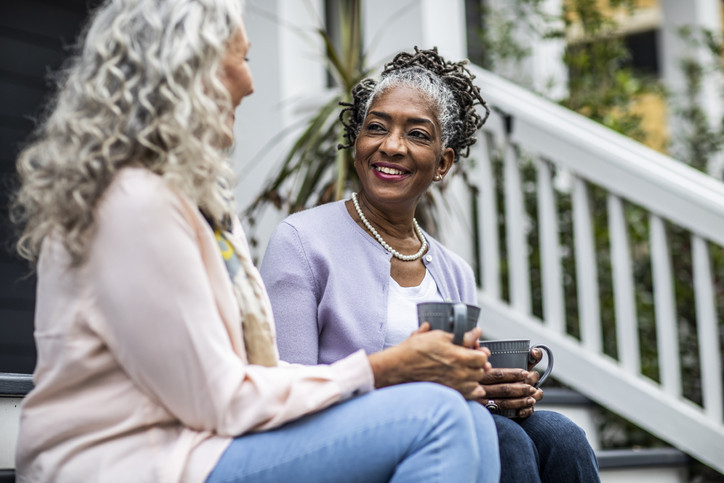Recent Articles

Medicare versus Medicaid: Key differences

Lost a tooth? What to know about dental implants

Hyperbaric oxygen therapy: Evidence-based uses and unproven claims

Gatorade. Liquid IV. Do you need extra electrolytes?

Sexual violence can cast a long shadow on health

Prostate cancer: Short-course radiation just as effective as longer-term treatments

Eggs, protein, and cholesterol: How to make eggs part of a heart-healthy diet

Can a quick snooze help with energy and focus? The science behind power naps

Autism: The challenges and opportunities of an adult diagnosis

Hospice care: Overview of a compassionate approach to end-of-life care
Relationships & Connections Archive
Articles
Lessons learned from COVID
While the COVID pandemic changed how many people approached their health, the experience offers a teachable moment about how people can maintain new and improved healthy habits. Four areas that were most affected by COVID and enabled people to create positive changes are exercise, diet, medical check-ups, and social connections.
Sexual feelings
Feelings of sexual desire change for both men and women as they age. Sometimes the desire is more robust for only one partner, or desires fluctuate so much that partners are rarely in sync. Talking about these changes and exploring different ways to approach this new phase of sex can help both partners find mutual enjoyment.
Even a little socializing is linked to longevity
In a 2023 study of more than 28,000 older adults, those who reported socializing the most frequently lived the longest, compared with people who said they didn't socialize.
IBD and LGBTQ+: How it can affect sexual health
Inflammatory bowel disease, a condition that causes inflammation along the gastrointestinal tract, has a major impact on daily life. For people who identify as LGBTQ+ there are some specific concerns and issues to understand and consider.
Helping children who are neurodiverse build friendships
Children with neurodevelopmental conditions like autism spectrum, ADHD, and intellectual disabilities may need extra support in building friendships and participating in social activities. Parents and other adults can help children develop their social and emotional skills.
Man's best (health) friend
Adopting a dog is one of the best ways for older adults to combat many common health issues. Research has shown that dog owners have lower risks of cardiovascular disease and take more daily steps compared with non-owners. Having a dog also can lower stress levels and help people become more social.
Social challenges such as isolation linked to earlier death
A 2023 study suggests that certain social challenges, such as isolation, may be useful to help predict older adults' risk of earlier death.
Better together: The many benefits of walking with friends
Going for a brisk walk with one or more friends has many health benefits. It's a form of socializing, which is good for thinking skills and helps stave off loneliness, isolation, and many chronic diseases. Walking with others helps people stay accountable and stick to an exercise regimen, and motivates and challenges them to work harder. Plus, it's safer to walk with buddies, who can all watch for hazards and call for help in an emergency.
Sowing the seeds of better health
About one in three Americans engages in gardening, and the activity became even more popular during the COVID pandemic. Research suggests gardening provides many physical and mental health benefits. It can boost movement, improve diet, fight illness, smooth mood, sharpen brain function, and strengthen social bonds. Gardeners should wear a hat and apply sunscreen to protect against sun exposure. They should also wear gloves to create a barrier against skin allergens on plants and bacteria or fungi in potting soil mixes.
Invisible illness: More than meets the eye
Invisible illnesses, meaning those that aren't obvious to other people, affect an estimated 10% of the 61 million Americans who have a physical or mental condition that limits their movement or senses. Some people fear disclosing their invisible illness will make them seem incapable or entitled, but keeping illness secret can lead to isolation. People who decide to disclose their hidden illness should keep descriptions simple, point others toward reputable information, tell people how the illness limits them, and seek support.
Recent Articles

Medicare versus Medicaid: Key differences

Lost a tooth? What to know about dental implants

Hyperbaric oxygen therapy: Evidence-based uses and unproven claims

Gatorade. Liquid IV. Do you need extra electrolytes?

Sexual violence can cast a long shadow on health

Prostate cancer: Short-course radiation just as effective as longer-term treatments

Eggs, protein, and cholesterol: How to make eggs part of a heart-healthy diet

Can a quick snooze help with energy and focus? The science behind power naps

Autism: The challenges and opportunities of an adult diagnosis

Hospice care: Overview of a compassionate approach to end-of-life care
Free Healthbeat Signup
Get the latest in health news delivered to your inbox!
Sign Up











